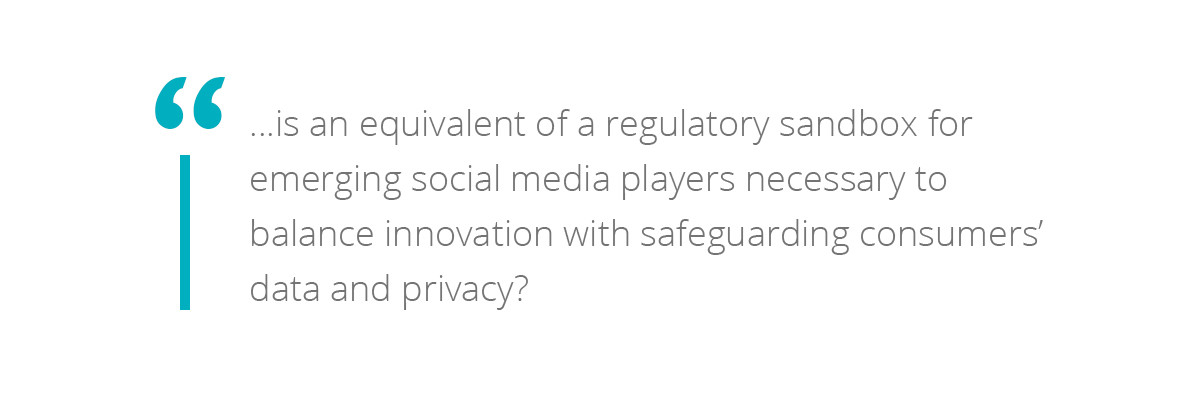ဒေတာထိန်းချုပ်မှုကို ယုံကြည်ပါသလား။
Klareco Insight
ပြီးခဲ့သည့်လအတွင်း ကွန်ဂရက်ရှေ့မှောက်၌ Mark Zukerberg မှ ထွက်ဆိုချိန်အတွင်း Senator John Nelly Kennedy (R-LA) မှ Facebook CEO အား “တစ်ယောက်ယောက်က မင်းကိုဖုန်းခေါ်ပြီး John Kennedy ရဲ့ ဖိုင်တွေကို ကြည့်ချင်တယ်” ဟု ဆိုလားနိုင်သလားဟု မေးမြန်းခဲ့ပါသည်။ “တကယ်လုပ်မလား” ဆိုသည်ထက် “လုပ်နိုင်သလား” ဟု မေးမြန်းခဲ့ရာတွင် နောက်ဆုံး၌ Zukerberg မှ “သဘောတရားအရ ကြည့်မယ်ဆိုရင် ဒီလိုလုပ်လာနိုင်ပါတယ်။ ဒါပေမဲ့ ဒီလိုပြောပြလိုက်မယ်ဆိုရင် ကျိုးဖောက်မှု အကြီးကြီး ဖြစ်လာမှာပါ။ ကျွန်ုပ်တို့ ဘယ်တော့မှ ဒီလိုထုတ်ပြမှာ မဟုတ်ပါဘူး” ဟု လက်ခံခဲ့ပါသည်။
Facebook အသုံးပြုသူ ၈၇ သန်းကျော်ကို ထိခိုက်စေခဲ့သည့် Cambridge Analytica ဒေတာကျိုးပေါက်မှုအပြီး လုပ်ဆောင်ခဲ့သော ဤကွန်ဂရက် တွေ့ဆုံမှုသည် လူမှုမီဒီယာ ပလက်ဖောင်းများတွင် ကိုယ်ရေးအချက်အလက်များအား အသုံးပြုမှုသည် အဖွဲ့အစည်း ကျင့်ဝတ်နှင့် စည်းမျဉ်းဆိုင်ရာ ပြဿနာဖြစ်ရုံသာမက ဆိုင်ဘာတိုက်ခိုက်မှုများအပေါ် နည်းပညာဆိုင်ရာ ကာကွယ်မှုအပေါ် ယုံကြည်နိုင်မှု ပြဿနာတစ်ခုလည်း ဖြစ်ကြောင်းကို သရုပ်ပြခဲ့ပါသည်။ ပြီးခဲ့သည့် ဆယ်စုနှစ်အတွင်း လူမှုမီဒီယာ ပလက်ဖောင်းများမှသာမက အခြားအွန်လိုင်းဝက်ဘ်ဆိုက်များနှင့် ရှာဖွေမှုအင်ဂျင်များမှ စုဆောင်းခဲ့သော ယခင်မကြုံခဲ့ဖူးသည့် ကိုယ်ရေးအချက်အလက် ပမာဏများကြောင့် အင်တာနက် ကုမ္ပဏီကြီးများထံသို့ စည်းကမ်းတင်းကြပ်မှုများ ဦးတည်လာရောက်နေပြီဖြစ်သည်ဟု Zukerberg ကိုယ်တိုင် ဝန်ခံခဲ့ပါသည်။
ဘဏ္ဍာရေးဝန်ဆောင်မှု အခန်းကဏ္ဍအတွက်မူ ခိုင်ခံ့သော ဒေတာကာကွယ်ရေး ဥပဒေများဖြင့် ကာကွယ်ပေးထားပြီး ဖြစ်ပါသည်။ ၁၉၉၉ ခုနှစ် Gramm-Leach-Biley Act (အက်ဥပဒေ) အရ ဘဏ္ဍာရေး အသုံးစနစ်များနှင့် ဝန်ဆောင်မှုများ ပေးအပ်သူများသည် ထိခိုက်မခံနိုင်သော ဒေတာများကို ကာကွယ်ပေးရုံသာမက ၎င်းတို့၏ သတင်းအချက်အလက် မျှဝေမှု လုပ်ငန်းစဉ်များကို client များထံသို့ ရှင်းပြပေးရန်လည်း လိုအပ်ပါသည်။ အယောင်ဆောင်ပြီး ပုဂ္ဂိုလ်ရေး အချက်အလက်များကို ရယူရန်ကြိုးပမ်းသည့် အလေ့အထများကိုလည်း တားမြစ်ထားပါသည်။
လူမှုမီဒီယာ ပလက်ဖောင်းများသည် ၎င်းတို့၏ သတင်းအချက်အလက် မျှဝေမှု လုပ်ငန်းစဉ်များကို ရှင်းပြပေးနိုင်ပါသည်။ ကွန်ဂရက်ရှေ့မှောက်တွင် Zukerberg ၏ ထွက်ဆိုချက်အပြီးတွင် Facebook သည် အသုံးပြုသူများ၏ ဒေတာများကို မည်သို့စုဆောင်းသည်၊ သိုလှောင်သည်၊ ဖျက်သည်နှင့် ပတ်သက်ပြီး ပိုမိုကောင်းမွန်စွာ ဖော်ပြပေးနိုင်ရန်အတွက် ၎င်း၏ဒေတာမူဝါဒကို အသစ်ပြင်ဆင်ခဲ့ပါသည်။ သို့သော်လည်း ၎င်းတို့ကို ဥပဒေရေးရာအရ အရေးယူနိုင်စွမ်းရှိသော ဥပဒေများ၏ ကျောထောက်နောက်ခံ မပါဘဲ ယုံကြည်နိုင်ပါသလား။ လူမှုမီဒီယာအတွက် မည်သို့ရလဒ်များ ရရှိလာနိုင်သလဲ။ ထိုမေးခွန်းတို့သည် Capitol Hill မှ ဥပဒေချမှတ်သူများအတွက် လက်ရှိစဉ်းစားဖွယ်ရာများ ဖြစ်နေပါသည်။

၁၉၉၉ ခုနှစ် ဥပဒေအား လိုက်နာခြင်းမရှိသော ဘဏ္ဍာရေး အဖွဲ့အစည်းများအနေဖြင့် ကျခံရမည့် ပြင်းထန်သော ငွေကြေးဆိုင်ရာ ပြစ်ဒဏ်များတွင် ဒဏ်ငွေများမှသည် ထိုအဖွဲ့အစည်းများမှ အရာရှိများနှင့် ဒါရိုက်တာများ ထောင်ဒဏ်ချမှတ်ခံရသည်အထိ ပြင်းထန်နိုင်ပါသည်။ သို့သော်လည်း အလားတူတားမြစ်ချက်များ ကမ္ဘာ့ဈေးကွက်ဦးဆောင် ဒစ်ဂျစ်တယ် C-suite များထံသို့ သက်ရောက်မှု မရှိခင် ဘဏ္ဍာရေးဝန်ဆောင်မှုများနှင့် လူမှုမီဒီယာ ပလက်ဖောင်းများအကြား ဒေတာစုဆောင်းမှုများမှာ အခြေခံသဘောတရားအရ အဘယ်ကြောင့် ကွာခြားရသည်ကို သတိပြုရန် လိုအပ်ပါသည်။
ဘဏ်များနှင့် ငွေပေးချေစနစ်များသည် အဓိကအားဖြင့် ငွေအလွှဲအပြောင်း လုပ်ဆောင်မှုအတွက် ရည်ရွယ်ပြီး ဒေတာများကို စုဆောင်းရခြင်း ဖြစ်ပါသည် – မည်သူမည်ဝါဖြစ်ကြောင်း ခွဲခြားခြင်းနှင့် ငွေလွှဲပြောင်းမှုများကို ခြေရာခံခြင်းများအတွက် လိမ်လည်မှု၊ အခွန်တိမ်းရှောင်ခြင်း၊ ငွေကြေးခဝါချခြင်းနှင့် အကြမ်းဖက်များထံ ငွေထောက်ပံ့ခြင်းများမှ ကာကွယ်နိုင်ရန်အတွက် ကိုယ်ရေးအချက်အလက် အမြောက်အများကို စုဆောင်းရန် မဖြစ်မနေ လိုအပ်ပါသည်။ အဆိုပါ စိုးရိမ်ဖွယ်ရာများနှင့် မသက်ဆိုင်ပါက အသုံးပြုသူများအနေဖြင့် ၎င်းတို့၏ အများသိအချက်အလက် မဟုတ်သော သတင်းအချက်အလက်တို့ကို အခြားမသက်ဆိုင်သည့် ကုမ္ပဏီများထံသို့ အသိပေးခြင်း မပြုရန် ရွေးချယ်နိုင်ပါသည်။
သုံးစွဲသူများအနေဖြင့် ရှာဖွေမှုအင်ဂျင်မှ မေးမြန်းရှာဖွေမှုများနှင့် လူမှုမီဒီယာ အသုံးပြုမှုများကြောင့် ဘဏ်တစ်ခုကို ပုံမှန်ပေးမည့် သတင်းအချက်အလက်ထက် များစွာပိုမိုသော ကိုယ်ရေးအချက်အလက်များကို မျှဝေလျက် ရှိကြပါသည်။ အင်တာနက် ကုမ္ပဏီကြီးများသည် အဆိုပါ ဒေတာတို့ကို အသုံးချ၍ ငွေရှာမည့် လုပ်ငန်းမော်ဒယ်တစ်ခုကို ဖန်တီးခဲ့ကြသည်။ ၎င်းတို့၏ ထိုသို့ငွေရှာနိုင်စွမ်းကို ကန့်သတ်လိုက်ပါက Facebook ဒါမှမဟုတ် Google သုံးဖို့ မည်သည့်ဈေးနှုန်းအထိ ကုန်ကျလာနိုင်ပါသလဲ။

စည်းကြပ်မှုများသည် အင်တာနက် ကုမ္ပဏီကြီးများအတွက်သာမက ၎င်းတို့နှင့် ယှဉ်ပြိုင်နိုင်ရန် အလားအလာရှိသည့် ထိုးဖောက်တီထွင်သူများအားလည်း ထိခိုက်စေလာနိုင်သည်ဟု စိုးရိမ်ပူပန်ဖွယ်ရာများလည်း ရှိနေပါသည်။ ထိုသို့ ထိခိုက်မှုကို FinTech လုပ်ငန်းစတင်ထူထောင်သည့် ကုမ္ပဏီငယ်များတွင် တွေ့ခဲ့ရပြီးဖြစ်ပြီး ၎င်းတို့သည် စည်းကြပ်မှုဆိုင်ရာ လိုအပ်ချက်အများအပြားကို လိုက်နာနိုင်ရန်အတွက် လိုအပ်သည့် အရင်းအမြစ်များ မရှိသည့်အတွက် ထိုသို့ ရင်းမြစ်စိုက်ထုတ်နိုင်သော ထူထောင်ပြီး ကုမ္ပဏီကြီးများမှ ၎င်းတို့အားသာချက်ကို ပိုမိုတိုးချဲ့လာနိုင်သည်ကို တွေ့ရပါသည်။ ထိုလုပ်ငန်းနယ်ပယ်မှပင် အဆိုပါ အလားအလာရှိသည့် လုပ်ငန်းသစ်အချို့အား ကူညီနိုင်ရန်အတွက် မွေးမြူထူထောင်ပေးသည့် အစီအစဉ်များသို့ ထည့်သွင်းခဲ့ကြပါသည်။ ဘဏ်များသည် ကိုယ်ပိုင် မွေးမြူထူထောင်ရေး အစီအစဉ်နှင့် အရှိန်မြှင့် အစီအစဉ်များကို လုပ်ဆောင်လျက် ရှိကြသည်။ စည်းကြပ်သူများမှ FinTech ဆန်းသစ်တီထွင်မှုများကို လမ်းဖွင့်ပေးနိုင်ရန် ကိုယ်တိုင်ပါဝင်နေသော စင်္ကာပူကဲ့သို့ အချို့ဈေးကွက်များတွင် ထူထောင်ဆဲ လုပ်ငန်းသစ်များအနေဖြင့် စည်းကြပ်ဥပဒေဘောင် အတွင်းမှ လုပ်ဆောင်ယှဉ်ပြိုင်နိုင်ရန် အခွင့်အလမ်းရှိလာမည် ဖြစ်ပါသည်။ ကျွန်ုပ်တို့အနေဖြင့် ပြန်လည်မေးရမည့် မေးခွန်းတစ်ခုမှာ ထူထောင်ဆဲ လူမှုမီဒီယာ လုပ်ငန်းသစ်များအတွက်မူ ဆန်းသစ်တီထွင်မှုနှင့် သုံးစွဲသူ၏ ဒေတာနှင့် ကိုယ်ရေးအချက်အလက် လုံခြုံမှုတို့အား ဟန်ချက်ထိန်းညှိရာတွင် စည်းကြပ်ဥပဒေဘောင်များ လိုအပ်ခြင်း ရှိမရှိဆိုသည့်အချက်ပင် ဖြစ်ပါသည်။

တုန့်ပြန်ချက်တစ်ခုမှာ တားမြစ်ချက်ထက် တာဝန်ယူမှုအပေါ် အာရုံစိုက်ထားပါသည်။ ယခုလအတွင်း သက်ရောက်လာမည့် ဥရောပသမ္မဂ၏ General Data Protection Regulation (GDPR) အရ အဖွဲ့အစည်းများ (ငွေကြေးဆိုင်ရာ အဖွဲ့အစည်း ဟုတ်သည်ဖြစ်စေ၊ မဟုတ်သည်ဖြစ်စေ) အနေဖြင့် ၎င်းတို့၏ စာချုပ်များနှင့် အသိပေးချက်များတွင် လူပုဂ္ဂိုလ်တို့၏ အခွင့်အရေးများကို ရှင်းလင်းစွာနှင့် တိကျစွာဖော်ပြပေးပြီး ၎င်းတို့၏ ကိုယ်ရေးဒေတာများကို အသုံးပြုနိုင်သော အဖွဲ့အစည်းများအပေါ် ပိုမိုကောင်းမွန်စွာ ထိန်းချုပ်နိုင်စွမ်း ပေးထားရန် လိုအပ်ပါသည်။ ဘဏ္ဍာရေး အဖွဲ့အစည်းများမှာ Client တစ်ဦးမှ ၎င်းတို့၏ဒေတာကို ဖျက်ပေးရန် တောင်းဆိုလာပါက အချိန်မှီ သင့်တင့်လျောက်ပတ်စွာ တုန့်ပြန်ရမည့် အဖွဲ့အစည်းများတွင် ပါဝင်ပါသည်။
ဤစည်းမျဉ်းသစ်တွင် ဦးတည်ချက်တစ်ခု ရှိသည်ဆိုပါက ထိုဦးတည်ချက်မှာ တာဝန်ယူမှုနှင့် ပွင့်လင်းမြင်သာမှုတို့ ရှိစေခြင်းဖြင့် ယုံကြည်မှုတည်ဆောက်ရန် ဖြစ်ပါသည်။ ဒစ်ဂျစ်တယ် လွှဲပြောင်းမှုများကို မဆုတ်မရွံ့ လုပ်ဆောင်နိုင်သော ကမ္ဘာသစ်အပေါ် ယုံကြည်မှုတည်ဆောက်ရန် မဖြစ်မနေ လိုအပ်လာပြီ ဖြစ်ပါသည်။ သင့်အနေဖြင့် ငွေပေးချေနေသည်ဖြစ်စေ၊ Selfie ရိုက်နေသည်ဖြစ်စေ သင်မျှဝေလိုက်သော အချက်အလက်များမှာ ယုံကြည်ရသူတို့၏ လက်ဝယ်တွင်ရှိနေသည်ဟု ယုံကြည်ရသင့်ပါသည်။


